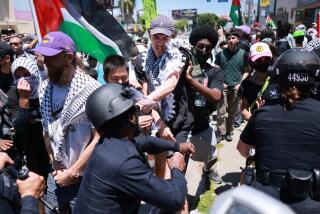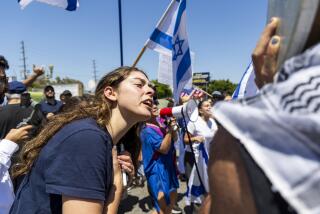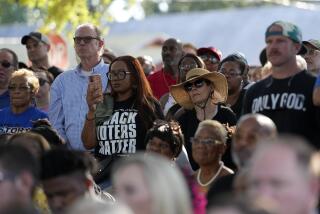Police Slaying Protest Draws Large Turnout in Riverside
- Share via
RIVERSIDE — They marched by the hundreds here Saturday--men, women and children of all colors and creeds--to protest what many said was a grave injustice committed by Riverside police against a young black woman.
Nearly two months to the day since 19-year-old Tyisha Miller died in a burst of bullets, supporters of the slain woman staged the peaceful demonstration. They walked nearly three miles from the gas station where Miller was shot by police to the steps of City Hall. The protest was led by the Rev. Jesse Jackson and members of the Miller family.
“We don’t seek revenge or retribution,” the civil rights leader told the marchers as they assembled at the Unocal gas station where four police officers fired on Miller as she sat in her car three days after Christmas. “We seek remedy and the end to the madness. . . . This is not about black and white. It’s about wrong and right.”
Organizers estimated that 700 to 1,000 people took part; police put the total at 800.
The demonstrators came from throughout the Southland. They included business owners, college students, families and professionals. There were whites, blacks, Asians and Latinos.
But whatever their differences, they were united in their desire to denounce alleged police misconduct and called for people to join together against injustice.
“I realize the world I make today is the one my daughter has to live in tomorrow,” Marcel Martinez, a Riverside County animal control worker, said as he pushed his 18-month-old girl, Erendira, in a stroller and wiped sweat from his forehead under the hot sun. “I want us all--blacks, Hispanics, everybody--to come together and help each other out when we need to.”
The Dec. 28 slaying sparked widespread outrage. Some activists accused the police officers--four whites--of acting aggressively because Miller was a black woman.
Responding to a call, the officers arrived at the Unocal station about 2 a.m. as Miller sat in her parked car, which was idling and had its windows rolled up. The officers shouted to the woman, who had a handgun in her lap and may have been unconscious. It is unclear why she had the weapon.
When Miller failed to respond, officers smashed a window. Initially, they said they opened fire because Miller shot first. Police later recanted that explanation, saying they opened fire when Miller reached for her gun. Twelve bullets struck Miller, who was killed instantly.
The case is being investigated by the Riverside County district attorney’s office, which is expected to release its findings soon. The FBI also is probing the shooting to determine whether the Justice Department should launch a full-scale civil rights investigation.
Riverside is a racially mixed community of about 240,000 people whose leaders take pride in promoting it as an All-America city, a designation it won last year.
Mayor Ron Loveridge, who attended a recent fund-raiser for the Miller family, has criticized Jackson, saying his recent remarks about the killing painted Riverside as a “hotbed of racial intolerance.”
On Saturday, Riverside Police Officers Assn. President Jeffrey Joseph questioned Jackson’s motives and tactics. “The language Rev. Jackson uses is full of ugly, inflammatory images. This kind of talk might make for good TV sound bites, but it demonstrates that he cares nothing for the truth,” said Joseph.
In announcing the march last week, Jackson told reporters that the four police officers acted as “judge, jury and executioner.” He also urged supporters to show up at the event to “stop the murder.”
On Saturday, Jackson said Miller was killed by a “firing squad.”
Marching next to the civil rights activist--and helping hoist a banner saying “Justice for Tyisha”--was singer and songwriter Kenneth “Babyface” Edmonds, accompanied by his wife, Tracey.
“It’s just wrong what happened,” the musician said. “The truth is it could have been anybody.”
At times, the march spread over three or four blocks. Marchers carried placards that read: “Death Penalty for Killer Cops,” “Save the Dream, Stop the Violence” and “No Justice, No Peace.”
They sang such songs as “We Shall Overcome” and chanted slogans about justice and police brutality. As the procession snaked its way along Magnolia Boulevard, a wide, tree-lined street, residents sat in their frontyards. Many cheered on the demonstrators or offered thumbs-up signs.
Jim Cox, who lives in Riverside, charged at Jackson and the front row of marchers as if he were going to challenge them. Instead, he squeezed next to Jackson, grabbed his hand and raised it high in the air.
“This has to stop,” Cox shouted to reporters and photographers. “No more killing.”
More to Read
Sign up for Essential California
The most important California stories and recommendations in your inbox every morning.
You may occasionally receive promotional content from the Los Angeles Times.











